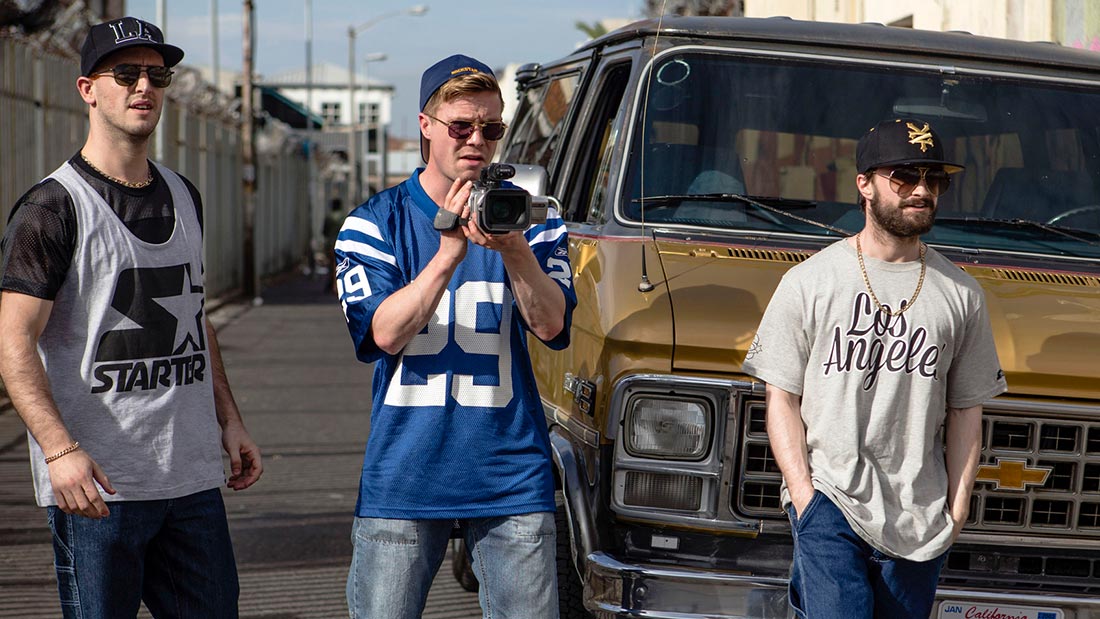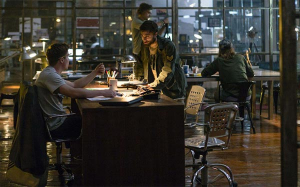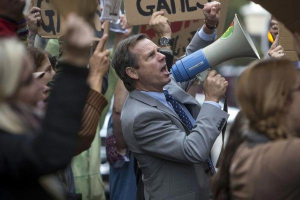If you’re not one of the Brits that caught it last night, The Gamechangers is a “factual drama” created for BBC 2 that deals with the tumultuous months leading up to the release of Rockstar Games’ massive hit video game Grand Theft Auto: San Andreas.
Before the film even begins, several disclaimers appear to make clear that this is an unofficial production with no involvement on the part of Rockstar whatsoever (to the extent that Rockstar is actually suing the BBC for trademark infringement). We’re also told that the events portrayed here have been dramatized for artistic effect and pieced together using information primarily gleamed from court documentation.
The first problem with this production though is in the characterization. Early on we’re introduced to our chief protagonist, Rockstar president and GTA producer Sam Houser (played by Daniel Radcliffe), and are treated to many scenes that amount to little more than one gigantic dump of exposition.
The beginning of the film is handled poorly as we never get to learn anything pertinent about Houser except for his fascination with film producers, digital sex scenes and an inner desire to make Grand Theft Auto: San Andreas the company’s next magnum opus.
Houser, as well as the rest of the supporting cast, come off as cringeworthy talking heads for the majority of this introduction and there’s rarely a moment where we’re inclined to learn more about their motivations or even care about what they want from this game aside from the obvious (money, recognition, fast cars etc.).
Game development by all accounts is made to look like a very bleak and depressing endeavour and the odd attempt at technical dialogue is simplified to a laughable degree.
“It’s hidden in the code, so he hacked it”… explains Houser, and you can almost hear it around the world: the sound of every programmers’ head simultaneously slamming into their cluttered desks. Ouch!
Indeed, Gamechangers seems to have very little interest in the actual making of the San Andreas software itself (amusingly illustrated by the company’s apparently instantaneous creation of a physics engine) and it instead chooses to concentrate on the political controversy that came about after its release.
The one scene involving any sort of action is one that quickly recaps the history of Devin Moore; a real-life teenager that committed three acts of first-degree murder against three Alabama policemen in 2003 and admitted to having been inspired to do so after playing Grand Theft Auto: Vice City for an extended period of time.
These murders are shown in fast and brutal detail and whilst certainly not lacking in their intended shock value, the message here is once again muddled. Is the film telling us that violent video games force people to commit horrendously violent acts? Or are we to suggest that such acts are simply the work of a very ill mind to begin with? It’s not clear where the film’s opinion really lies.
Compounding this ambiguity is the introduction of Jack Thompson (played by Bill Paxton); the real-life activist and lawyer who launched a one-man vendetta against Rockstar after hearing about Devin Moore’s admission that Grand Theft Auto inspired him to commit his infamous crime.
One of the most commonly reviled figures in the field of video game criticism, Thompson is nevertheless portrayed in a more grounded way than you’d first expect; acting the part of a dedicated Christian with a personality that shifts between familial gentleness and righteous rage.
As the story’s ‘kinda sorta’ antagonist, Thompson soon comes across as an obsessive whose fervent crusade lands him the ire of gamers everywhere. The death threats soon follow, as well as the physical abuse of his family and an eventual case of legal malpractice that costs him his job.
Perhaps somewhat ironically though, we get more of an impression of who Thompson is and what he wants than perhaps any other figure in this story and whilst Paxton’s performance does stray into hamsville on at least one occasion, the depiction is quite effective in driving home what kind of incensed individual Rockstar was up against during this time.
Likewise, a well-bearded Daniel Radcliffe does a reasonable job of presenting Houser as a enthused worker turned troubled megalomaniac, but the script that he and the rest of the cast are lumbered with never presents an opportunity for the audience to care about their characters.
About halfway through the film we’re introduced to the infamous Hot Coffee incident; a real-life scandal where a previously cut sex minigame on the published San Andreas DVD was discovered and restored by a passionate Swedish modder called Patrick Wildenborg.
Hot Coffee was a political quagmire for Rockstar and to its credit, The Gamechangers does manage to give you a very clear impression of this. Protests ensue, inquiries are held and Radcliffe’s performance does well to highlight the physical and emotional toll that this humiliating event would have taken on those involved.
But the coverage just isn’t bold enough. Details of the resulting fan backlash (Rockstar initially tried to claim that modders had hacked the explicit content into the game), the mandatory software recall and pure overall silliness of the minigame in question (where participants are fully clothed) are either briefly touched upon or not brought up at all.
In that same vein, you’re sort of given the impression that Sam Houser is GTA’s only creator as many key members of the Rockstar North development team don’t get so much as even a brief mention.
As a matter of fact, the actual history behind this company and its now legendary series of games is curiously downplayed throughout. The hallowed halls of the company’s original Edinburgh office are only referenced in a rather negative aside and the former name of DMA Design features as a mere sight reference as does Rockstar‘s (then) future game Bully for some strange reason.
And by the time the end credits rolled, I just couldn’t find a reason for anything I had just watched. At its core, the story of San Andreas just isn’t really that interesting to begin with and so to approach it with such lacklustre characterisation and poor understanding of video game development is just really puzzling to me. Why bother?
If you have even a reasonable tenure as a reader of CelJaded then it may not surprise you if I said “I didn’t learn anything here”, but I’m hardly a firsthand expert either and I would have enjoyed the opportunity to at least find out a few things that I didn’t know about this cornerstone of video game culture.
If you really want to learn more about this subject then I’d much sooner recommend David Kushner’s book called Jacked: The Outlaw Story of Grand Theft Auto. Although the characterization in this book is similarly thin on the ground (Kushner explains how tight-lipped industry figures were concerning the Hot Coffee controversy), it does a much better job of providing insight behind the game’s creation and resulting media-fueled furor.
Calling The Gamechangers outright awful is probably a bit harsh though. I didn’t hate the performances of the two big names involved and I do appreciate the attempt it made in making Hot Coffee seem like a big deal, because it definitely was.
But this film is ultimately lacking in anything that might threaten to make it entertaining or insightful. This is a bleak drama that will either bore or anger any knowledgeable viewer whilst ultimately passing by those who are not.
Out of all the reactions I’ve seen from actual game developers though, I think one of the original Grand Theft Auto co-creators (and supposed break dancing superstar*); that is Mike Dailly, summarized it best:
“The only good thing about that program, was that the media actually tried to make a TV program about games.”
—
*don’t ask.




Leave A Comment